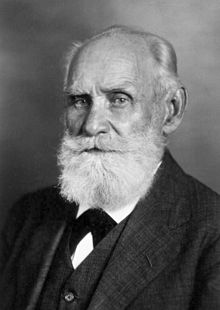In psychology, classical conditioning is a type of associative learning that links automatic behaviors with previously neutral, or unrelated, stimuli. Ivan Pavlov’s experiments on dog digestion first introduced the concept of learned associations to the psychology community by demonstrating the transformation of a neutral stimulus into a stimulus that can prompt unconscious behavior. In his experiments, Ivan Pavlov recognized that the natural, unlearned response of dogs to the presence of food was salivation. Salivation was not a learned behavior, but an automatic response to a natural stimulus (food) in the dog’s environment. In this case, food is an unconditioned stimulus because it always induces salivation, which, itself, is an unconditioned response. These two variables encompass a natural stimulus-response relationship, which Pavlov sought to infiltrate with a third variable.
Ivan Pavlov:

Ivan Pavlov wondered if introducing a neutral stimulus before the unconditioned stimulus would cause a dog to associate both stimuli with salivation. In other words, would the dog execute the unconditioned response of salivation even before the unconditioned stimulus is presented? If this neutral stimulus, able to be perceived by the dog but not naturally associated with his experiment’s unconditioned stimulus (food), regularly preceded the arrival of the unconditioned stimulus, would the dog eventually begin salivating before the unconditioned stimulus (food) even arrived? The answer is yes. Pavlov and his fellow researches sounded a bell before presenting a dog with food for several trials. Once the food was given to the dog, the dog would salivate.
Principally, the sound of the bell was a neutral stimulus. It did not naturally cause the dog to salivate. However, through its continuous pairing with the unconditioned stimulus, food, the sound of the bell became conditioned. Acquisition took place as the dogs learned the link between the sound of the bell (the neutral stimulus) and the arrival of food. Eventually, as classical conditioning completed, the dogs salivated at the sound of the bell alone because they began to anticipate the arrival of food.
One episode of The Office demonstrates this concept of classical conditioning. Jim, a character on the show, conditions his coworker Dwight to reach for an altoid every time his computer shuts down. Because his computer emits an audible noise every time it shuts down, Jim is able to condition Dwight into associating meaning with the sound of his computer shutting down. As mentioned in the text, “small aural components convey meaning,” This clip of The Office demonstrates why and how, seemingly insignificant aural sounds like the sound of a computer turning off, can provoke unconscious or conscious meaning in our lives. In this case, every time Dwight hears the sound of a computer shutting down, he unconsciously reaches for an altoid.
The following variables are necessary to understand the following clip of The Office:
Unconditioned Stimulus: offering an altoid
Unconditioned Response: reaching to grab the altoid
Conditioned Stimulus: sound of the computer shutting down
Conditioned Response: reaching to grab the altoid
Jim Classically Conditions Dwight on The Office:
https://vimeo.com/35754924
Link to photo of Ivan Pavlov:
https://en.wikipedia.org/wiki/Ivan_Pavlov
